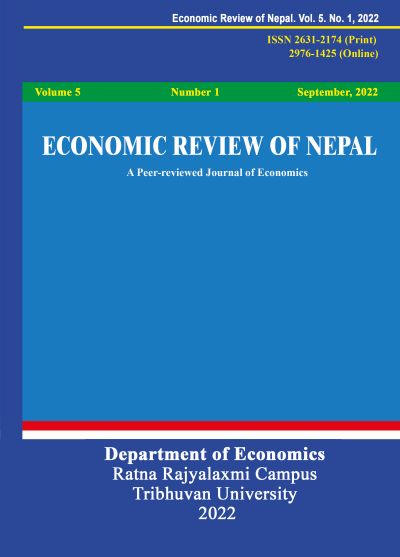Financial Deepening in Nepal: An Asymmetric Analysis With Per Capita Income and Private Sector Credit
DOI:
https://doi.org/10.3126/ern.v5i1.66039Keywords:
asymmetric relationship, NARDL, positive shocks, financial deepening, structural breakAbstract
This study examines the asymmetric relationship between private sector credit and per capita income defining financial deepening using annual time-series data from 1994 to 2021. The analysis employed Zivot unit-root testing to identify a significant break in the model and NARDL cointegration analysis to account for this structural break, while also assessing the long-term asymmetric relationship. Findings suggested a cointegrating relationship with private sector credit, indicating that positive shocks in private sector credit contribute to its growth, thereby boosting per capita income and promoting financial deepening in Nepal. Although short-term negative shocks in the private sector were notable, their impact on long-term income growth was minimal. The study highlights the government's role in fostering positive growth of private sector credit to enhance financial deepening in Nepal, cautioning against excessive credit disbursement during recessions or crises, which could undermine financial deepening in the long run; however, the short-run policy revisions during the time of crises are thinkable. This study addresses a geographical gap in prior research by incorporating nonlinearity and structural break unit-root tests, previously unexplored, thereby introducing a novel contribution to the existing body of literature.
Downloads
Downloads
Published
How to Cite
Issue
Section
License
Copyright (c) 2022 Department of Economics, Ratna Rajyalaxmi Campus

This work is licensed under a Creative Commons Attribution-NonCommercial 4.0 International License.
This license enables reusers to distribute, remix, adapt, and build upon the material in any medium or format for noncommercial purposes only, and only so long as attribution is given to the creator.




